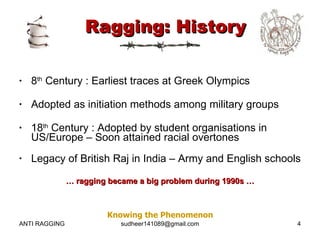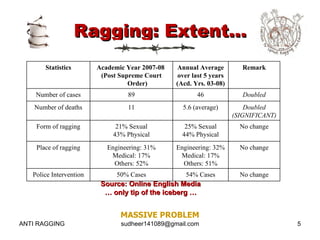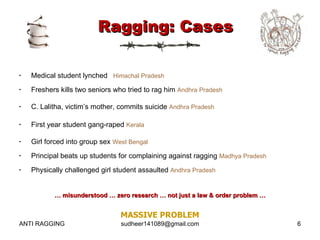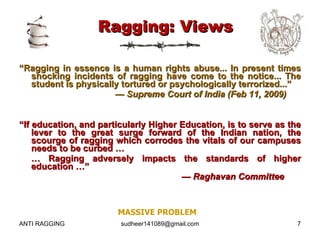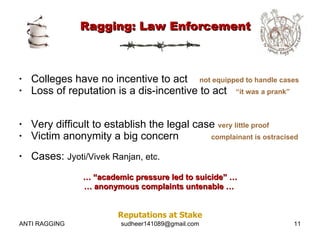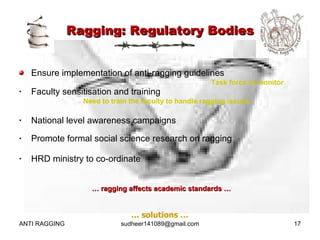Ragging In India
- 1. Ragging in India SUDHEER MCA in RVR&JC college of engg.,Guntur [email_address]
- 2. Ragging: Outline Basic facts Extent of the problem The complexities involved Solutions Why are we failing? Outline
- 3. Ragging: Facts Traditional and systemic human rights abuse Colleges and universities are most affected Forms vary from healthy interaction to severe physical and mental abuse South Asia is worst affected International variants – Hazing, Fagging, Bullying… Knowing the Phenomenon
- 4. Ragging: History 8 th Century : Earliest traces at Greek Olympics Adopted as initiation methods among military groups 18 th Century : Adopted by student organisations in US/Europe – Soon attained racial overtones Legacy of British Raj in India – Army and English schools … ragging became a big problem during 1990s … Knowing the Phenomenon
- 5. Ragging: Extent... Source: Online English Media … only tip of the iceberg … MASSIVE PROBLEM No change 54% Cases 50% Cases Police Intervention No change Engineering: 32% Medical: 17% Others: 51% Engineering: 31% Medical: 17% Others: 52% Place of ragging No change 25% Sexual 44% Physical 21% Sexual 43% Physical Form of ragging Doubled (SIGNIFICANT) 5.6 (average) 11 Number of deaths Doubled 46 89 Number of cases Remark Annual Average over last 5 years (Acd. Yrs. 03-08) Academic Year 2007-08 (Post Supreme Court Order) Statistics
- 6. Ragging: Cases Medical student lynched Himachal Pradesh Freshers kills two seniors who tried to rag him Andhra Pradesh C. Lalitha, victim’s mother, commits suicide Andhra Pradesh First year student gang-raped Kerala Girl forced into group sex West Bengal Principal beats up students for complaining against ragging Madhya Pradesh Physically challenged girl student assaulted Andhra Pradesh … misunderstood … zero research … not just a law & order problem … MASSIVE PROBLEM
- 7. Ragging: Views “ Ragging in essence is a human rights abuse... In present times shocking incidents of ragging have come to the notice... The student is physically tortured or psychologically terrorized...” — Supreme Court of India (Feb 11, 2009) “ If education, and particularly Higher Education, is to serve as the lever to the great surge forward of the Indian nation, the scourge of ragging which corrodes the vitals of our campuses needs to be curbed … … Ragging adversely impacts the standards of higher education …” — Raghavan Committee MASSIVE PROBLEM
- 8. Why is it so hard to address?
- 9. Ragging: Bird’s Eye Societal Acceptance & Denial “Boldness”, “Growing up pill” Law Enforcement vs. Reputation “It was a prank”, victim’s character assassination Psychology Vicious Circle – victim becomes the perpetrator … misunderstood … zero research … not just a law & order problem … Why is it a MASSIVE Problem?
- 10. Ragging: Societal Denial Ragging makes the fresher BOLD BOLDNESS is standing up against oppression, not succumbing to it! Ragging helps break the ice Archaic method of interaction. Several other scientific ways of team-building and ice-breaking … several other myths and confusions … parallels in Dowry? Sati? … Myths and Facts
- 11. Ragging: Law Enforcement Colleges have no incentive to act not equipped to handle cases Loss of reputation is a dis-incentive to act “it was a prank” Very difficult to establish the legal case very little proof Victim anonymity a big concern complainant is ostracised Cases: Jyoti/Vivek Ranjan, etc. … “ academic pressure led to suicide” … … anonymous complaints untenable … Reputations at Stake
- 12. Ragging: Psychology Vicious Circle Victim is the next perpetrator. Stockholm syndrome Victims ‘be-friend’ the perpetrators Milligram experiment, Stanford prison experiment Zero research … burning need for formal research to understand the problem better … … calling all social scientists and funding agencies … Vicious Circle
- 13. Coming together towards a solution…
- 14. Ragging: Stakeholders … all stakeholders need to work together … Towards a Solution… Students – Seniors and Freshers College Authorities Parents & Family Society Law Enforcement Media Legislature and Executive
- 15. Ragging: Solution Directions … three-pronged approach … Towards a Solution… Sensitisation & Awareness Alternate Means of Interaction Strict Law Enforcement
- 16. Ragging: College Authorities Sensitisation programs for freshers and seniors Promote cultural & sports activities for fresher-senior interaction Staggered entry for freshers and seniors Pro-active checking in hostels Regular anonymous surveys of the entire fresher batch … colleges liable for failure to check ragging … … solutions …
- 17. Ragging: Regulatory Bodies Ensure implementation of anti-ragging guidelines Task force to monitor Faculty sensitisation and training Need to train the faculty to handle ragging issues National level awareness campaigns Promote formal social science research on ragging HRD ministry to co-ordinate … ragging affects academic standards … … solutions …
- 18. Ragging: Central/State Govt Establish clarity and accountability between various stakeholders National level awareness campaigns Audio-Visual Campaigns, Public Debates, Youth Icons, etc. Ragging sensitisation in school curriculum NCERT/SCERTs Setup a toll-free national level helpline Encourage NGOs working in the sector … ragging affects nation’s education system … … solutions …
- 19. Ragging: Media Sensitise media to its role in ragging eradication Bring out the larger problem of ragging Avoid sensationalism Spicy stuff defocuses the attention Ragging needs to be established as a social taboo Today it is fashionable to rag … public opinion is the key … … solutions …
- 20. … Hard to Believe …
- 21. Why are we not succeeding?
- 22. Ragging: Think… Have all the recommendations been properly publicised? Have our institutions become immune to ragging? Do we have the resources to tackle this problem? Is there clarity on who needs to drive what? Are we really serious enough to solve this? … are we really convinced about the magnitude of this menace? … … questions …
- 23. THANKYOU
![Ragging in India SUDHEER MCA in RVR&JC college of engg.,Guntur [email_address]](https://image.slidesharecdn.com/ragginginindia-091025230742-phpapp02/85/Ragging-In-India-1-320.jpg)


